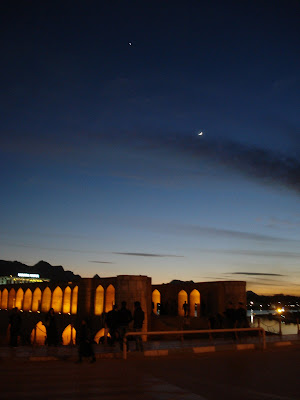Kuwaiti Women Power
In the third parliamentary election within only three years, four women have won seats in the Kuwaiti parliament yesterday. Women have fought successfully for their voting rights in 2005. I remember with much sympathy the women of Kuwait demonstrating in front of the parliament when inside lawmakers eventually agreed to give them the right to vote. When I congratulated some of my female Kuwaiti colleagues, open-minded and westernized, well-educated young women, they argued, however, that the right to vote may only strengthen the influence of the Islamists in the country. The paradox may be explained as follows. Very traditional Kuwaiti family fathers have, of course, up to four wives and plenty of grown-up but still unmarried daughters who, in all likelihood, will vote what the householder prefers: one man, several votes.
In the following parliamentary election in 2006, and two years later when the parliament had untimely been dissolved by the Amir of Kuwait, His Highness Sheikh Sabah Al Ahmed, women failed to win seats in the very much male-dominated Islamic country. Now they eventually succeeded. Congratulations to former Minister of Health Massouma al-Mubarak, Salwa al Jassar and liberal candidates Aseel Awadhi and Rola Dashti!
The widely perceived retardation of scientific, cultural and human rights development in many if not most Islamic countries may be due to an important fact. In rapidly growing societies with population growth rates of between 3 and 5%, countries are soon evolving into, well, boys’ countries. The testosterone factor of the frequently unemployed, unmarried into their thirties and therefore profoundly unsatisfied young men, who have, if at least realistic, little hope for change, are running the society at the low-level, while male-dominated administrations try to keep this power under control only by restricting normal civil rights.
A typical example of a boys’ country is, of course, Saudi-Arabia. Despite undisputable rights for equal education women in Iran suffer from a mainly male-dominated and completely outdated interpretation of Shari’a family law. In particular, women rights movements there are brutally suppressed. Boys’ countries are undemocratic.
Yesterday’s Kuwait election is a flicker of hope after the previous very much annoying legislative period.
First published at Freelance.
In the following parliamentary election in 2006, and two years later when the parliament had untimely been dissolved by the Amir of Kuwait, His Highness Sheikh Sabah Al Ahmed, women failed to win seats in the very much male-dominated Islamic country. Now they eventually succeeded. Congratulations to former Minister of Health Massouma al-Mubarak, Salwa al Jassar and liberal candidates Aseel Awadhi and Rola Dashti!
The widely perceived retardation of scientific, cultural and human rights development in many if not most Islamic countries may be due to an important fact. In rapidly growing societies with population growth rates of between 3 and 5%, countries are soon evolving into, well, boys’ countries. The testosterone factor of the frequently unemployed, unmarried into their thirties and therefore profoundly unsatisfied young men, who have, if at least realistic, little hope for change, are running the society at the low-level, while male-dominated administrations try to keep this power under control only by restricting normal civil rights.
A typical example of a boys’ country is, of course, Saudi-Arabia. Despite undisputable rights for equal education women in Iran suffer from a mainly male-dominated and completely outdated interpretation of Shari’a family law. In particular, women rights movements there are brutally suppressed. Boys’ countries are undemocratic.
Yesterday’s Kuwait election is a flicker of hope after the previous very much annoying legislative period.
First published at Freelance.



Comments